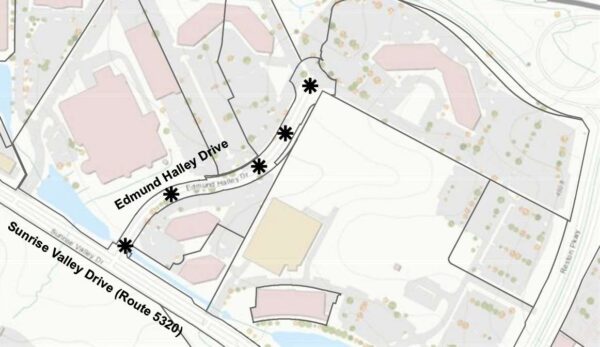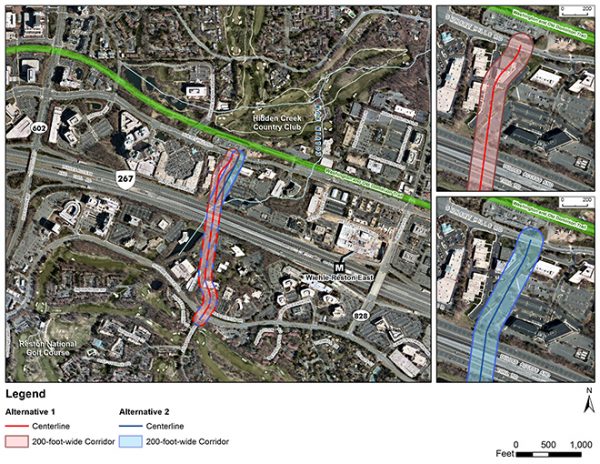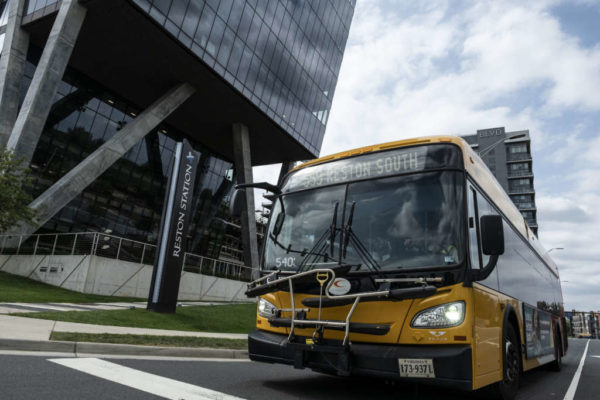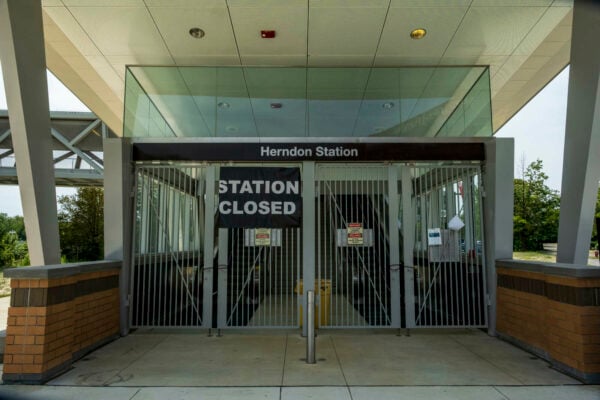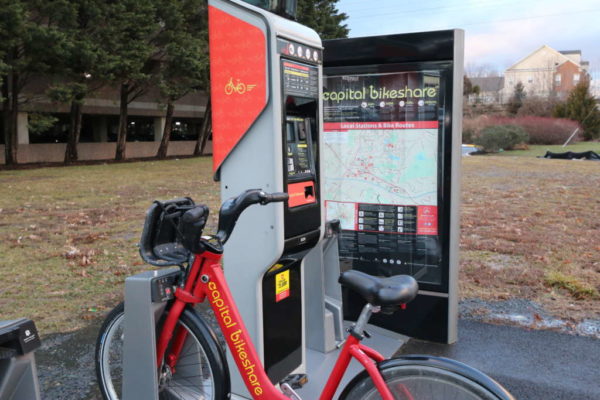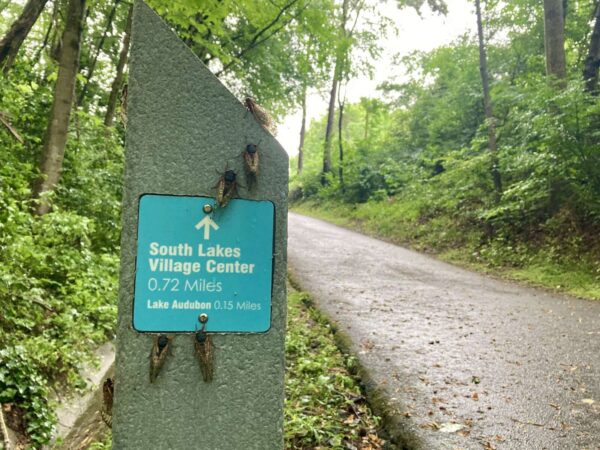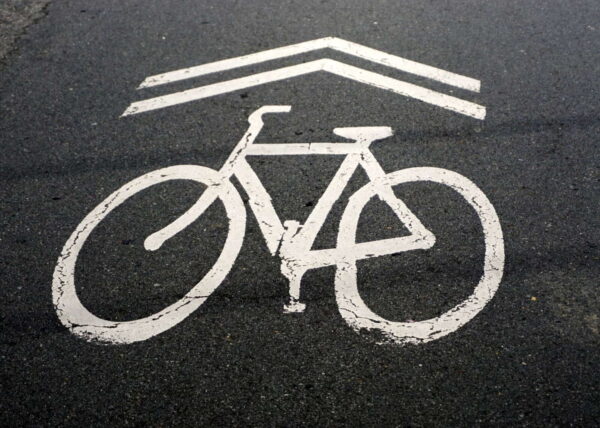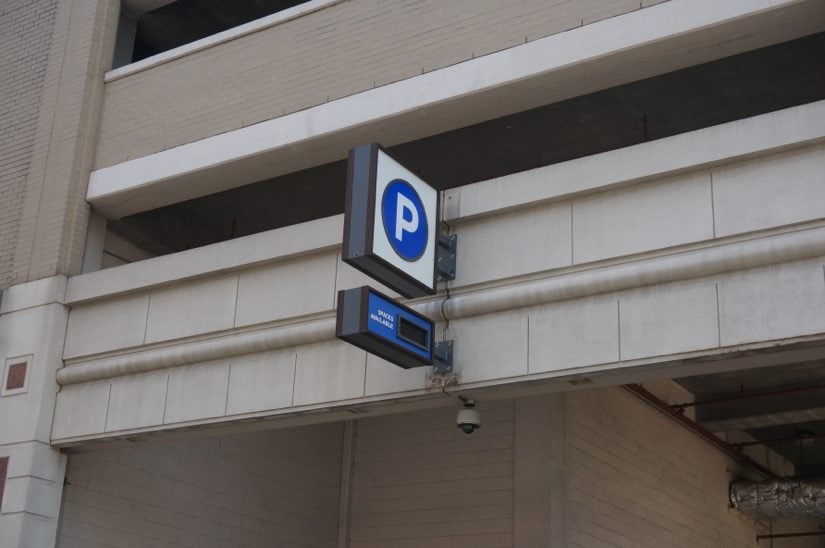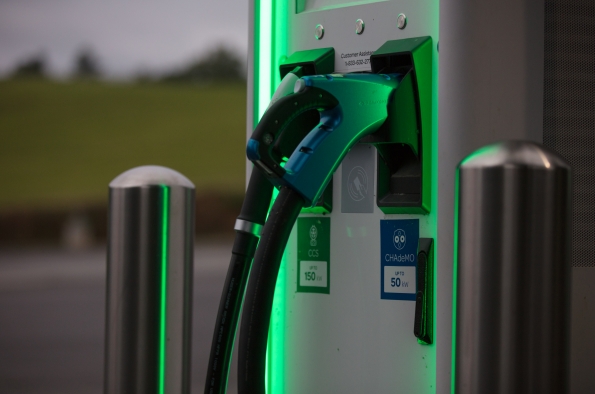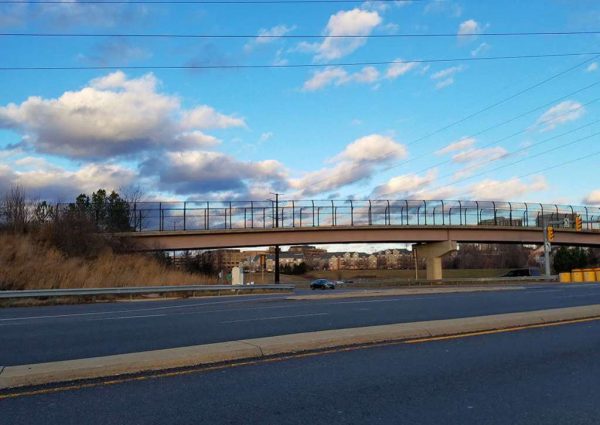A portion of Edmund Halley Drive has officially been transferred over to the state.
At a Tuesday meeting, the Fairfax County Board of Supervisors unanimously voted to transfer a section of the road to the Secondary System of State Highways, a move made in preparation of the completion of phase two of the Silver Line.
The move — which was stipulated in proffer agreements for the Reston Crossing project — allows the state to have unrestricted right-of-way along the road.
The formerly private street was improved with bike lanes, a trail, and a sidewalk in order to meet requirements in the Fairfax County Comprehensive Plan.
The street was also widened to meet requirements set by the Virginia Department of Transportation.
The street will connect to the Reston Town Center Metro Station from Sunrise Valley Drive.
New York-based company Tishman Speyer is developing Reston Crossing, a two-million-square development south of the Dulles Toll Road between Edmund Halley Drive and Reston Parkway.
The project was approved in 2019.
The county is still mulling ways on how to minimize the impact of the Soapstone Connector on historic areas surrounding the proposed one-mile extension between Sunrise Valley Drive and Sunset Hills Road.
The $235 million project has been on the county’s drawing board for years. Earlier this month, the county officially approved plans to seek $75 million in Northern Virginia Transportation Authority funding for its FY2022-2027 funding program.
The Soapstone Connector is located west of the Wiehe-Reston East Metro Station and would include a new bridge across the Dulles Toll Road. Pedestrian and bicyclist accommodations are also planned as part of the massive project.
But construction isn’t expected to begin until fiscal year 2027, a spokesperson for the Fairfax County Department of Transportation tells Reston Now. County transportation officials anticipate the project will be funded from federal dollars — which requires the county to determine how the project would impact historic resources.
An initial analysis found that the proposed project does not significantly impact historical resources in the Washington and Old Dominion Railroad and yhe Wiehle Historic District. The Virginia Department of Historic Resources has officially agreed with this conclusion.
But the project would have an adverse effect on properties in the Association Drive Historic District (ADHD).
“Once it was concluded that there were no prudent and feasible alternative to impacting the ADHD, a determination was made that the Soapstone Connector would have an Adverse Effect to the ADHD. Once this determination of Adverse Effect is made, the next step is to develop a strategy to mitigate the Adverse Effect,” Robin Geiger of FCDOT told Reston Now.
The county is working with state and federal partners to develop a mitigation strategy. But details on plans have not yet been made public. Discussions on proposed alternatives have been underway since at least 2018.
Starting over Labor Day weekend, transfers between Metro trains and Fairfax Connector buses will be free.
The Fairfax County Department of Transportation (FCDOT) said yesterday (Monday) it has partnered with the Washington Metropolitan Area Transit Authority (WMATA) to provide free transfers on nearly all Connector bus routes beginning on Sunday (Sept. 5).
This lines up with Metro’s new policy of also offering free bus transfers, which was first announced earlier this month.
“Fairfax Connector has historically aligned fare policies with Metrobus and by doing so, helps create a seamless experience for users when moving between transit services provided by WMATA and the County,” FCDOT spokesperson Robin Geiger wrote in an email. “That’s why we are partnering with WMATA to extend their program to Fairfax Connector bus service to provide good customer service and provide incentives to ride transit.”
The two exceptions will be the Fairfax Connector Express Service and the Wolf Trap shuttle. Both will be discounted by $2, though, with the use of WMATA’s SmarTrip card or app.
This is a pilot program that will operate for the next 10 months, through early July 2022, Geiger says.
Fairfax Connector serves all Metro stations located in Fairfax County. This will include all Silver Line Phase 2 stations once those open, Geiger confirms.
Additionally, the Wolf Trap shuttle will start again operating on Sept. 5. The shuttle runs between the West Falls Church Metro station and Wolf Trap National Park’s Filene Center.
The new policy is part of a larger push to encourage increased ridership on the Fairfax Connector as schools, offices, and other public places reopen amid the COVID-19 pandemic.
“We hope that when people go back to their workplaces, they consider returning to or trying transit for the first time,” writes Geiger. “Now, is the time to ride because the free transfer from Fairfax Connector to Metrorail or from Metrorail to Fairfax Connector saves money and because Fairfax Connector continues to provide a safe and healthy environment on buses.”
In May, county officials said they were reviewing possibly reducing or even eliminating fares altogether on the Fairfax Connector.
To help with this, the county was planning to apply for grant funds from Virginia’s Transit Ridership Incentive Program. The application deadline for the program is Sept. 17. Geiger says there’s currently no additional information on the possibility of reducing or eliminating fares.
Members of the Fairfax County Department of Transportation and the Southgate Community Center officially welcomed 19 new Capital Bikeshare stations to Reston yesterday (Tuesday).
“The expansion gives many more people in Reston easy access to bike share stations, like the one…at the South Gate Community Center,” Hunter Mill District Supervisor Walter Alcorn said at the ribbon-cutting ceremony. “They especially provide more access south of the Dulles toll road where it is needed.”
The newest installation more than doubles the number of stations in Reston, which had 16 existing locations.
The Capital Bikeshare program originally launched in Reston in 2016. By 2019, the area saw 7,800 bike-share trips, though the COVID-19 pandemic led to a dip in rides in 2020, when there were only 4,400 trips.
“2021 Bikeshare trips are rebounding, and the people are already riding bikes from the newly installed locations,” according to Alcorn.
Among the new locations, the bicycles on Seahawk Drive and Ridge Heights Road have been getting the most use. The Southgate Community Center is getting lots of use as well, landing in the top four most-used of the new sites.
Alcorn did note that the program is still working on choosing ideal locations.
“This is a work in progress,” he said. “This is something we’re learning as we go, and frankly, as people in the community make their choices on where to use these things and when to use them we will adapt and support accordingly.”
Capital Bikeshare locations are chosen with specific criteria in mind. In order to host a new Bikeshare station, a site should be:
- A trip generator — a place that people will be traveling to and from
- A community center or shopping center
- In or near development density
- In proximity to transit for those who want to bike from home to their transit to work
- An equitable location to serve those who want to bike but may not have a bicycle of their own
- In a sunny spot for the solar panels
Alcorn also mentioned that most stations are put on the street in existing public parking spots to save time and money in creating the location.
Fairfax County is already working on another expansion in the Vienna and Merrifield area.
“The future is bright for Capital Bikeshare in Fairfax County,” Alcorn said. “The system throughout the National Capital region has more than 600 locations so far. We are going to continue to expand Bikeshare in the county with planned, grant-funded locations in the Providence District and building on what we have in the Merrifield area in Tysons. This program is one way that Fairfax County is innovating to find new ways for people to get around.”
The Metropolitan Washington Airports Authority (MWAA) will not meet its Labor Day deadline for substantial completion of Silver Line Phase 2, likely pushing back the opening of the long-delayed $2.8 billion project yet again.
The announcement came in the final minutes of the Fairfax County Board of Supervisors’ transportation committee meeting earlier this week.
The delay is related to the work done this past weekend (June 26-27) to tie together the Silver Line’s second phase with the operating first phase at Wiehle-Reston East Metro station, forcing the station to close.
“We were made aware that the tie-in between Phase 1 and Phase 2, which was partially done this weekend, will actually need an additional weekend,” Martha Elena Coello, special projects division chief for the Fairfax County Department of Transportation, told the committee.
She noted that this was different information than what was in the presentation that had been prepared for the meeting.
“That will impact the substantial completion day of Labor Day and the magnitude of that impact has not been determined yet,” she said. “We expect to have that information within two weeks.”
An MWAA spokesperson confirmed that this is the case.
While MWAA told Reston Now last week that an additional weekend and a second shutdown of the Wiehle-Reston East Metro station will be needed to complete the work, it wasn’t clear how it would affect the timeline of the entire project.
Now, it’s clear that MWAA will not be handing over the project to the Washington Metropolitan Area Transit Authority (WMATA) by Labor Day weekend, which is only eight weeks from now. At this point, it is unknown when completion and hand-off could take place.
Metro needs about six months from substantial completion to complete testing and open the system, according to the presentation to the county board’s transportation committee.
With a Labor Day hand-off, Silver Line Phase 2 could reasonably be assumed to open in early March 2022. Now, the operating date could be pushed further into spring or even later.
When asked what work was completed last weekend and what still needs to be done, MWAA spokesperson Marcia McAllister told Reston Now by email that it was mostly electrical tasks:
This past weekend, the connection of the Traction Power system between Phase 2 of the Silver Line and the existing Metrorail system was successfully completed at the Wiehle-Reston East Metrorail Station. In addition, work was done to connect the Automatic Train Control System (ATC).The work was done by crews from Capital Rail Construction (CRC) and the Washington Metropolitan Area Transit Authority (WMATA) working closely together. The Airports Authority is now reviewing the work that remains to be done at the ATC tie-in prior to completion of the rail line and is assessing any schedule impacts.
She added in a follow-up that additional work still needs to be done, but a date has not been set for the next outage and shutdown of the Wiehle-Reston East Metro station.
Overall, Phase 2 is 99% completed, but even beyond the tie-in, there remains work still to be done around third-rail insulators, station platform pavings, and more.
However, Coello noted at the meeting that a majority of this work needs to be completed by revenue service and can be done after MWAA’s handoff to WMATA.
This is far from the first delay to beset the Silver Line’s second phase, which was initially set to be completed in 2018. The project will extend Metro from Reston into Loudoun County with six new stations.
The timeline has been prolonged by contractor issues, design changes, flawed materials, defective panels, and bad concrete, testing the patience and viability of a number of local Reston and Herndon businesses that intentionally set up shop near the stations.
Now, businesses, residents, and the region are going to have to wait at least a little bit longer for Silver Line Phase 2 to finally open.
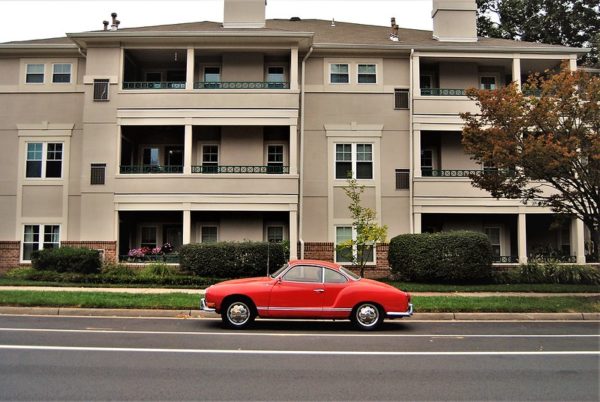
Fairfax County is seeking public feedback about people’s parking habits and priorities in Reston and Tysons with a survey available now in English and Spanish until the end of July.
County staff are using the online survey to help establish a managed parking program in the Reston Transit Station Areas and Tysons Urban Center, which they hope will address issues ranging from limited parking options to avoiding vehicles reportedly remaining in spaces for weeks at a time.
In addition to asking about people’s current parking habits, the survey tells respondents to prioritize five factors that affect when and where they decide to park:
- Lowest price or free
- Proximity of parking to desired location
- Flexible payment options (credit cards, smartphone apps)
- Ability to pay with cash
- Overnight parking is allowed for free
The county is looking to get input from both commuters and residents. In addition to filling out the survey, community members can submit comments through an online feedback form, by mail to the Fairfax County Department of Transportation, and by calling 703-877-5600.
The survey will build on the results of a two-year study that FCDOT conducted to look at the availability of on-street parking on state-owned roads in Tysons and Reston.
In Reston, the study found just 211 on-street spaces along 15 miles of public curbs, amounting to a 6% coverage. Recommendations included implementing timed or paid parking near Metro stations to encourage turnover and addressing issues with commercial vehicles parking in front of businesses.
The county is looking to support businesses with “shorter duration parking and parking space turnover,” according to a page about the survey.
“Ultimately, the goal is to provide parking that supports the mixed-use development in these increasingly-urban areas of the County,” FCDOT said in a news release.
County staff is slated to use the information from the survey to propose policy and ordinance changes to the Board of Supervisors later this year. FCDOT says the managed parking plans will mostly not take effect until new grids of streets are built in Tysons and Reston and accepted by the Virginia Department of Transportation.
It took longer than anticipated, but Capital Bikeshare is finally expanding in Reston, a move that has been in the works since August 2017.
The Fairfax County Department of Transportation will start installing 19 new stations throughout Reston in early July, FCDOT spokesperson Robin Geiger told Reston Now.
Previously expected to take place in early 2020, the expansion was stalled by the COVID-19 pandemic. It will more than double the size of the bicycle-sharing service in the area, which currently has 16 operating stations.
“We did have significant production delays as a result of the pandemic, affecting both bicycles and stations,” Geiger said. “…More information about the installation will be coming this summer.”
Funded by a $1 million federal Transportation Alternatives Program grant, the new stations will be located at:
- Baron Cameron Avenue and North Hampton Avenue
- Becontree Lane and Goldenrain Court
- Fairway Drive and Hook Road
- Golf Course Square and Golf Course Drive
- Green Range Drive and Glade Drive
- Inlet Court and Wiehle Drive
- Lake Newport Road and Autumn Ridge Circle
- Links Drive and Wedge Drive
- North Village Road and Park Garden Lane
- Olde Crafts Drive and Cartwright Place
- Reston Parkway and Bennington Woods Road
- Ridge Heights Road and Owl Cove Lane
- Ridge Heights Road and Seahawks Drive
- Ring Road and North Shore Drive
- Soapstone Drive Convenience Center
- South Gate Community Center
- South Lakes Drive and Reston Parkway
- Vantage Hill Road & Wainwright Drive
- Wainwright Drive and North Shore Drive
Geiger says Fairfax County is still considering adding a station at Reston Community Center’s Hunter Woods facility, but that location could not be included in this phase because federal funding can’t support projects on private property.
The county joined Bikeshare in 2016, concentrating the 17 initial stations in Reston and Tysons to support Metro’s newly opened Silver Line Phase 1.
According to Geiger, the service was doing well prior to the pandemic, particularly in Merrifield, which was the site of its most recent expansion. Merrifield and Vienna are now slated to get 10 more stations.
Like other transportation services, though, Bikeshare saw a significant drop in usage due to COVID-19, with both ridership and membership taking hits as people limited travel and many started working from home.
“At its worst, early in the pandemic membership was around 20% of ridership when compared to past years,” Geiger said by email. “Most of the lost trips were by annual members who were commuting by bicycle.”
Fairfax County saw a 50% decrease in Bikeshare riders in 2020 overall compared to 2019.
Geiger says ridership levels did start to pick back up last summer, primarily from non-members, meaning people who were utilizing the service for a single trip or day instead of getting an ongoing subscription.
“Usage patterns systemwide changed as well, with fewer trips to Metro stations, but more to recreational locations, and grocery stores,” she said.
With the upcoming Bikeshare expansion, county officials hope to see a resurgence in usage as people return to public spaces and communal activities. One such activity could be coming to Reston, thanks to the impending bicycle stations.
“We plan to have an event celebrating the installation sometime this summer, probably in August,” Geiger said.
Second COVID-19 Vaccine Could Be Approved for Teens — “Biotechnology company Moderna announced Tuesday that its two-shot coronavirus vaccine produced the same protective immune response in teens as it does in adults, and the firm said it plans to submit the data to U.S. regulators for review in early June. If authorized, the vaccine would become the second available for adolescents as young as 12.” [The Washington Post]
Fairfax County Updates COVID-19 Vaccine Dashboard — The Fairfax County Health Department launched an updated version of its vaccine dashboard yesterday (Tuesday) with data on administered doses, how many people have gotten vaccinated, demographic breakdowns, and other information. [FCHD]
Preliminary Work Begins on W&OD Wiehle Bridge — “Preliminary work is being performed @ the Wiehle Ave intersection in Reston in preparation for the eventual bridge there. Over the next couple of weeks, Dominion Energy will be making improvements to the gravel trail so that it may be used as a detour as they relocate facilities.” [The W&OD Trail/Twitter]
Man Hit with Bottle in Castle Rock Square — Police responded to the 2200 block of Castle Rock Square in Reston around 11:49 p.m. on Monday (May 24), when a man was hit “in the upper body with a bottle by someone known to him,” the department says. The victim in the incident, which was not a stabbing as initially reported by a scanner, said that he didn’t want the case to be investigated by officers. [FCPD]
County to Hold Meeting on Proposed Bicycle Lanes — Fairfax County will hold a virtual meeting at 6:30 p.m. on June 8 to discuss striping changes that would create bicycle lanes on several roads. The Hunter Mill District proposals focus on Herndon, adding lanes on segments of McNair Farms Drive and Thomas Jefferson Drive and converting the “underutilized” outside travel lanes on Coppermine Road to buffered bike lanes. [FCDOT]
Herndon Company Recognized for Veteran Hiring — “Herndon-headquartered Serco North America earned the designation VETS Indexes 5 Star Employer as part of the 2021 VETS Indexes Employer Awards. The designation recognizes Serco’s commitment to recruiting, hiring, retaining, developing and supporting veteran employees, military spouses and others in the military community.” [Fairfax County EDA]
Photo by Marjorie Copson
Concerns about the maintenance of trails and other bicycle and pedestrian facilities took center stage at the Fairfax County Department of Transportation’s ActiveFairfax Transportation Plan community conversation for the Hunter Mill District on Monday (April 19).
The virtual meeting was part of the initial public comment phase of the county’s efforts to develop the ActiveFairfax Transportation Plan, which will establish a vision and goals for supporting non-motorized or self-propelled travel.
Examples of active transportation include walking, riding a bike or horse, running, hiking, and the use of rolling devices such as wheelchairs, scooters, and strollers.
Nicole Wynands, the ActiveFairfax project manager, hosted the Hunter Mill District conversation, one of 11 public meetings that have been scheduled this month.
Attendees of the Hunter Mill District meeting identified the maintenance of pedestrian and bicycle facilities as well as hiking, mountain biking, and equestrian trails as a primary concern, requesting more clarity around where community members should go to report maintenance issues.
Maintenance is a shared responsibility between various agencies, including the county and the Virginia Department of Transportation.
Maintenance issues of concern included debris cluttering paths and bike lanes, encroaching landscaping or trees encroaching the paths, and snow being plowed onto pathways. Suggestions to improve these issues included the county encouraging VDOT to dedicate funds for bicycle facility maintenance.
Wynands clarified that tree or shrub trimming is complaint-based, but added that the ActiveFairfax plan “will make recommendations in regards to maintenance.”
Commenters also called for more efforts to educate the public on varying crosswalk functions and ways that mountain bike or equestrian trail users can prevent the trails from being damaged, such as not utilizing them following inclement weather.
Wynands described the new ActiveFairfax Transportation Plan as a necessary measure to mitigate inconsistencies between the county’s various existing pedestrian and bicycle plans and to meet national standards and best practices for facility and design plans.
“In order for us to effectively implement the vision for the biking and walking network, we will need to create one recommendation that is consistent, particularly with the region-wide plan and the area plans,” Wynands said.
Wynands added that Phase One of the ActiveFairfax plan — which began in July 2020 — will run through July. Public engagement will continue through May 15, with a public review of the plan expected by the end of May. A final version will then be presented to the Fairfax County Board of Supervisors.
The community survey is still available online, along with interactive maps for community members to identify key destinations and barriers and suggest locations for new trails, bikeways, and street enhancements.
The second phase of the plan will be implemented immediately following the conclusion of the first, and it’s expected to take a year or year and a half, according to Wynands.
Priorities in the second phase include creating a facility selection toolkit, providing network and program recommendations, implementing guidance, prioritizing funding, and working on a comprehensive plan amendment.
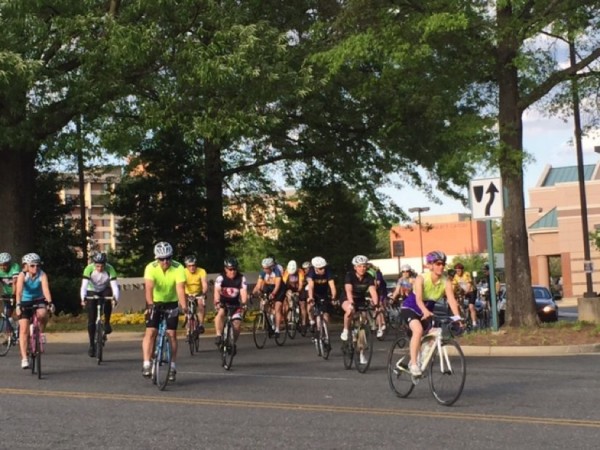
The Fairfax County Department of Transportation will host a series of virtual discussions next month for community members to share their thoughts on walking, bicycling, and other modes of travel that don’t involve getting inside a car.
The community conversations are intended to give county staff insight into people’s travel habits and areas where the county could improve bicycle and pedestrian access or facilities as part of FCDOT’s efforts to develop a new ActiveFairfax Transportation Plan.
“Community input is critical to the success of this planning effort,” FCDOT spokesperson Anna Nissinen said in a statement. “We want to hear all perspectives, from families biking and walking within the community to individuals who use scooters and bike share as part of their commute. This is the only way to create a comprehensive and functional plan that truly supports the needs of the community.”
12 online meetings have been scheduled, starting with an evening conversation for Mason District residents on April 8. The Hunter Mill District meeting will take place on Monday, April 19 at 7 p.m.
There will also be a meeting in Spanish on April 15 at 7 p.m. and two “Lunch and Learn” sessions at noon on April 13 and 23.
A recording of the event and the presentation will be available on the ActiveFairfax webpage for anyone unable to attend a meeting. There is also an online survey for community members to share their perspective on barriers to non-motorized travel, potential trail and bicycle network improvements, and other topics.
The Fairfax County Board of Supervisors directed FCDOT to review its plan for active transportation — defined by the county as “self-propelled, human-powered travel” such as walking, cycling, or using a scooter or wheelchair — in January 2020.
Launched last summer, the project is divided into two phases. First, FCDOT is developing a vision statement laying out the county’s goals, evaluating existing conditions, and creating a plan for a systematic safety program. Then, the department will come up with recommendations, including potential comprehensive plan updates and project and policy prioritization.
Local officials have been looking at ways to enhance Fairfax County’s bikeability and walkability, particularly in urbanizing areas like Tysons and Reston, to improve safety and reflect people’s evolving travel habits.
The National Capital Region Transportation Planning Board’s most recent Regional Travel Survey found that the number of bicycle trips in the D.C. area has doubled over the past decade, though the amount of daily walking trips has remained steady.
“The plan will establish a vision and a roadmap for implementation of safe, convenient, and enjoyable streets, sidewalks, bike facilities, and trails in Fairfax County for people of all ages and abilities,” Nissinen said. “The plan will support livable street design through the development of a transportation network that connects people to where they live, work, play, learn and take transit.”
Fairfax County is seeking public input on proposed Fairfax Connector changes that could dramatically alter bus service in the area as part of the county’s ten-year Transit Strategic Plan.
The proposed changes would impact a number of Herndon-Reston routes and create new ones, including Sterling-Herndon and Reston Town Center Metro station (when it finally opens) to Herndon High School.
The goal of the changes is to provide better access to destinations, improve travel times, increase schedule reliability and frequency, and increase overall services, according to the county’s press release.
The county is also looking to provide more access to schools, hospitals, and transit centers, decrease average travel times on popular routes, and to improve efficiency by cutting duplicating connections. Changes would be “initially developed as budget neutral,” according to the county.
There will be three virtual community input meetings next week (Jan. 12, 13, and 14) and public comments will be accepted until Feb. 21.
To increase participation, Fairfax County Department of Transportation is mailing out a brochure to every county resident this month that will direct people to the online survey. The brochure is also translated into nine different languages. The public has already had some chance to comment on a number of the subareas, including the Herndon-Reston routes, according to Robin Geiger, a spokeswoman for the Fairfax County Department of Transportation.
Due to this, these particular route updates can go to the Board of Supervisors and will be implemented prior to the entire transit strategic plan. These route changes and updates are expected to be approved and ready to go for when phase two of the Silver Line, Geiger tells Reston Now, since it incorporates two Metro stations into the routes.
Silver Line Phase 2 is currently scheduled to open in the fall, at the earliest.
However, if residents would like to comment on the Herndon-Reston routes and how they will be incorporated into the county’s overall transportation plan, Geiger says they are welcome to do so.
“We want to hear from everyone,” she says.
The Fairfax County Board of Supervisors gave the county’s transportation department permission this week to start work on plans for managed curbside parking in Tysons and Reston.
Whether the plan includes paid parking, time-limited parking, designated commercial vehicle parking, or some combination, the Fairfax County Department of Transportation will need at least a year to draw one up for the Board of Supervisors to review, staff said during a board transportation committee meeting on Tuesday.
The incremental step forward comes after professional traffic engineers released their findings from a two-year study that analyzed current parking habits in Tysons’ urban center and Reston’s transit station areas as well as potential options to manage parking.
“Currently in the county, we have a very limited toolbox of parking restrictions that can be implemented by either the Board or VDOT,” FCDOT Section Chief Neil Freschman said. “Generally, most on-street parking on public roadways is uncontrolled.”
The study found that public on-street parking in Reston is incredibly limited.
Parking is available on just 6% of the 15 miles of public curb space surrounding the Wiehle-Reston East, Reston Town Center, and Herndon Metrorail stations, FCDOT Senior Transportation Planner Henri Stein McCartney said.
“We found 211 total public on-street spaces within the study area, which is pretty low,” she said. “Most parking is on private streets, which we don’t manage.”
Comparatively, Tysons had more parking. Staff found 1,272 spaces along 22 miles — or 29% — of curb space on the roadways surrounding the Greensboro, Springhill, Tysons, and McLean Metro stations.
However, parking in Tysons suffers from other problems, including cars parked in “No Parking” zones and travel lanes, along with large commercial vehicles that overstay their welcome.
“Some of these vehicles are reportedly parking for days or weeks without moving,” McCartney said. “Our parking staff has received multiple complaints from Tysons businesses about commercial vehicles that are parking long-term near their building, so we know this is an issue.”
Transportation Committee Vice-Chair Kathy Smith, who represents Sully District, told Tysons Reporter that commercial vehicles parking for extended periods is a county-wide issue.
“I think it’s good that staff is looking into how to balance people’s ability to get into businesses and getting more turnover,” Smith said. “Everybody would agree you don’t want commercial vehicles taking up space for days.”
This parking plan is being developed alongside changes to the street grid in Tysons and Reston, Hunter Mill District Supervisor Walter Alcorn told Tysons Reporter. In some cases, parking policies will be developed for streets that do not yet exist, but have been incorporated into the two communities’ comprehensive plans to be more transit-oriented.
The management plan should encourage parking spot turnover to ensure that these future streets near transit stations, which are lined with mixed-use properties, do not become commuter lots, he said.
However, managed parking in Reston’s transit areas will have to overcome the controversy that Boston Properties ignited when the property manager introduced and later modified paid parking at the Reston Town Center.
“The number one lesson is, don’t make all your streets private,” Alcorn said. “We have an awful lot of private streets. What we’ve learned is that the public doesn’t have any say — it is up to the private street owner.”
While private streets make planning events more flexible, Alcorn says the 2017 flare-up, which focused mostly on the garage parking, could also be attributed in part to community members not having a say.
For the most part, though, what FCDOT is working on “is apples and oranges” compared to the RTC, he said.
Image via Fairfax County
The Fairfax County Board of Supervisors indicated interest in a pilot program for electric-powered buses during its transportation committee meeting on Tuesday (Nov. 10).
During the meeting, Fairfax County Department of Transportation Director Tom Biesiadny delivered an presentation that explained the “ins and outs” of electric vehicles and and included a proposal for moving forward with a pilot plan.
The next step would be to return to the supervisors with a more in-depth financial plan that includes details such as when and where this would take place, and how long the demonstration would last, which could be in the early part of 2021, Biesiadny says.
“This is exciting,”said Board of Supervisors Chairman Jeffrey McKay. “Clearly we need to jump into this area and we need to do it quickly.”
Providence Supervisor Dalia Palchick supported a pilot because it would help ensure the county implements these changes correctly.
“This is the future,” she said. “We need to stop going backward. I’m hopeful to see a plan not just to see a pilot but do a demonstration project, which in my mind, means ‘how can we move forward?'”
A pilot with four buses could cost between $3.8 million and $4.2 million, a gross cost that does not take into account sources of funding. Some money has been set aside through a bus replacement program, and there are grants available, Biesiadny said.
FCDOT has in-house and external expertise from Fairfax’s “ongoing partnership with Dominion Energy” and the Richmond Highway Bus Rapid Transit team to draw from, said Tom Reynolds, the FCDOT Section Chief of Transit Services Division.
The pilot would help the department learn about the buses’ range and charging, how they perform during different seasons of the year and on various local and express routes, and what staff training needs to be done, Reynolds said.
“The sooner we do the pilot, the sooner we see the results of it, the sooner we can start to make longer-term decisions about some of the capital costs that would be necessary if we were to expand this,” McKay said.
When the county talks about costs, Palchik — who said she developed childhood asthma living in the area — and Braddock Supervisor James Walkinshaw emphasized the costs of treating asthma and the health impacts of poor air quality.
“In Virginia, we spend $87 million a year because of asthma hospitalization,” Walkinshaw said. “Fairfax County is lower, but Route One is higher. Annandale is higher. Other parts of the county are higher. It would be a small thing, but as we look at this pilot, we might want to look at locating it in parts of the county that have been hit harder by asthma.”
Fairfax County’s first effort to introduce electric vehicles into public transit came this year with the autonomous Relay shuttle now operating in the Mosaic District. That demonstration project is a partnership with Dominion Energy, Biesiadny said.
Photo via Electrify America
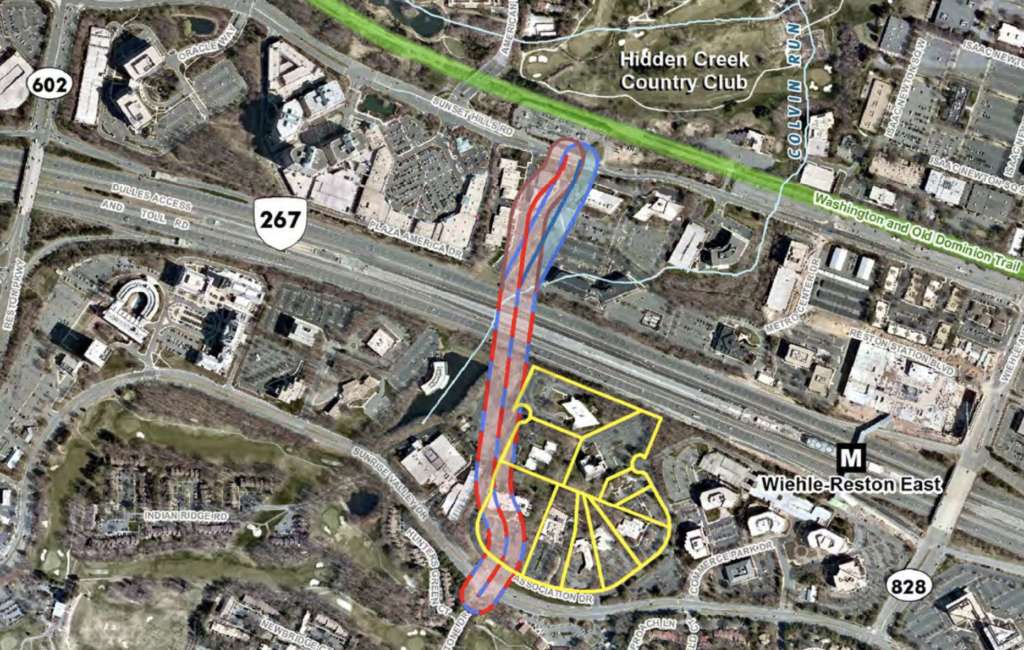
The Fairfax County Department of Transportation is considering two design options for the Soapstone Connector.
The connector would create a new one-mile roadway between Sunrise Valley Drive and Sunset Hills Road. A bridge would be built over the Dulles Corridor, providing an additional crossing that is critical to reducing congested areas along Wiehle Avenue.
An FCDOT spokesperson told Reston Now it was too early to share plans, which are still in development. But the two options would avoid the historic area on Association Drive.
Once the designs are finalized, FCDOT will work with the community to determine how to move forward. A decision on the most suitable alternative is expected in the beginning of next year, FCDOT spokesperson Robin Geiger told Reston Now.
The Soapstone Connector was approved for full funding by the Fairfax County Board of Supervisors in December 2019.
The project secured a big win when it received $15 million in funding from the Northern Virginia Transportation Authority through its six-year funding program in July.
An application to the Commonwealth Transportation Board for additional funding was submitted on August 17. A decision on the application is expected in the summer of 2021.
Map via handout/Fairfax County Government
The Fairfax County Department of Transportation plans to hold its first set of virtual community input meetings to display preliminary recommendations for the Fairfax County and Franconia-Springfield Parkways Alternatives Analysis and Long-Term Planning Study.
According to a statement released by the county, there will be three opportunities to participate. The sessions will be held on July 29, July 30, and Aug 4.
FCDOT has held two rounds of community input over the past two years. Their mission is to gather feedback from the community and identify deficiencies along the Parkway corridors
The department is aiming to maximize efficiency for commuters while serving local residents at the same time. Officials want to minimize the impacts that more efficiency will have on the community and the environment, according to the county website.
FCDOT plans to evaluate final recommendations in its transportation models and send them to the Board of Supervisors this winter, according to the website. FCDOT will begin the process of amending the Comprehensive Plan in Spring 2021 following endorsement by the Fairfax County Board of Supervisors.
File photo


